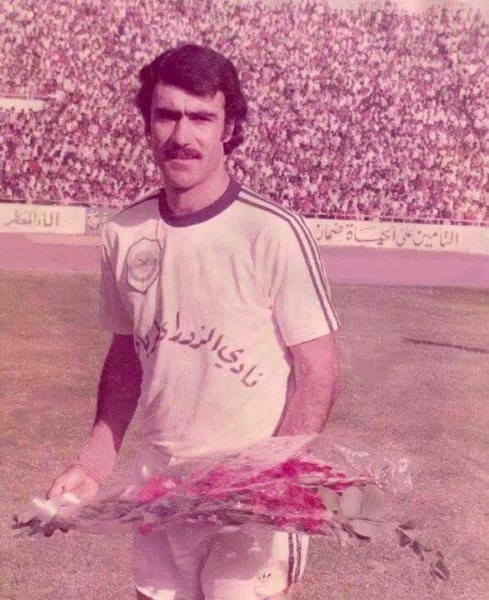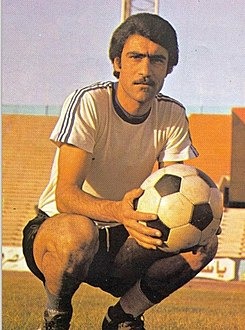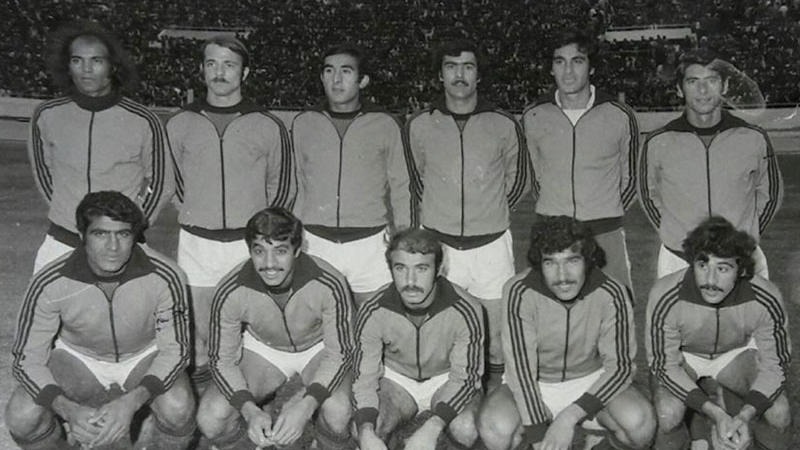The Iraqi Ali Kazem .. The Gulf’s super hat-trick

One of the greatest players of the Black Mesopotamia throughout history, who put his fingerprints and recorded his name in letters of light in the memory of the people of the Arab Gulf since the first participation of Iraq in the Gulf Cup, the owner of the white hands in the participation of Mesopotamia in the Military World Cup, deserved the title of Super Hat-Trick of the Gulf.
One of Iraq’s most prominent stars, Ali Kazem, was born on January 1, 1949. He gained a very wide reputation inside Iraq, as well as in the Gulf countries, because he is one of the great strikers and goalscorers. He had many achievements with Iraqi football, most notably winning three World Military Championships in the seventies of the last century. He also led Al-Zawraa club to win the league title three times in the seventies of the last century, as well as the cup title four times, in addition to his active contribution to the victory of the Police Club in the Arab Police Championship, which was held in Damascus in 1978, and won the title of top scorer after scoring eight goals. He was loaned from Al-Zawraa for the police team in that tournament, because he was affiliated with the Iraqi Ministry of Interior at the time.

Ali Kazem formed a historical duet with his colleague Falah Hassan, in Al-Zawraa, and with the various Iraqi teams. He also gained great fame at the level of the Arab Gulf after the Iraqi national team participated for the first time in the history of the Gulf championships in Gulf 4, which was held in Doha in 1976, in which he provided high levels and won the best striker in the tournament, and he was very close to the top scorer title after being equal with the two Kuwaiti stars Jassem Yaqoub and Faisal Al-Dakhil with the number of goals, each with eight goals.
Ali Kazim had a close relationship with the Bahraini goalkeeper, Hammoud Sultan, after he managed to score 12 goals in three matches against him, at an average of four goals per match, and scored three goals against the Saudi goalkeeper, Mabrouk Al Turki in Gulf 4.

Ali Kazem has made many achievements with the Iraqi military teams, as he is the most prominent player in the history of military football. He won three World Cups, the first in 1972 in Baghdad under the leadership of coach Adel Bashir, where he achieved the championship after winning over Greece and Côte d’Ivoire, and a draw with Turkey and Italy. While Vietnam withdrew from the tournament, and Ali Kazem scored a goal against Côte d’Ivoire in the final match that ended 3-0 for Iraq. The second championship was in 1977 in Damascus led by German Reichelt Lekerer, and Ali Kazem scored a four-goal win against Bahrain against the goalkeeper, Hammoud Sultan in Baghdad within the qualifiers led by the Almighty coach Amo Baba, and after overcoming the Emirates also in the qualifiers, he contributed with the military team to achieving the championship after defeating the groups teams (West Germany, France and Nigeria), and qualifying for the final, so that Ali Kazem scored one of the decisive penalty shootouts against Kuwait, who was led by the best coach of Brazil Mario Zagallo and his assistant Carlos Alberto Pereira. The match ended in favor of Iraq 5-4 after it ended in its original and extra time with a goalless draw.
The third tournament was in 1979 in Kuwait, led by coach Amo Baba, and Ali Kazem scored 5 goals in this tournament, 3 of which were against Bahrain and one against Austria. He scored one of the penalty shootouts against Italy, which ended 4-3 after the two teams tied negatively in the original time.

Ali Kazem’s last participation with the Iraqi teams was in the finals of the Moscow Olympics in 1980. On that day, he played his last international matche against the East German team in the quarter-finals, and it ended in favor of the Germans (4-0).
Ali Kazem retired from playing in 1981, and a retirement match was held for him between his team, Al-Zawraa, and the police team in 1984, and he entered the training world, as he worked as an assistant to his late colleague Abdul Kazem in training the Iraqi junior team in 1985, then he took over the task of training Al-Zawraa in the eighties of the last century and also at the beginning of the nineties, and he led them to win the title of the first Mother of Battles Championship. Then he went to external professionalism, where he supervised the training of several Jordanian, Omani and Yemeni teams, and also supervised the training of the Salah al-Din team, and achieved good results with them, but the disease that afflicted him, which is the erosion of the pelvic bones, made him stop his coaching career for a while as he traveled to the Czech Republic, Kuwait, Qatar and other countries for treatment.

On January 2, 2018, the media announced his death in Baghdad after his struggle with the illness, to turn a bright page for one of the most prominent players in the Arab Gulf.

